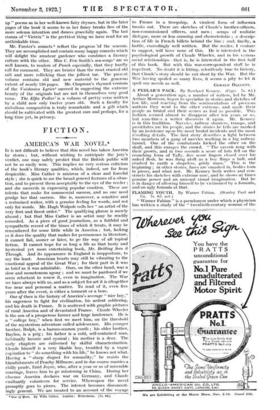FICTION
AMERICA'S WAR NOVEL.*
IT is not difficult to believe that this novel has taken America by storm ; but, without wishing to anticipate the jury's verdict, one may safely predict that the British public will not be so easily won. This implies no very serious criticism of the book's literary qualities, which, indeed, are far from despicable. Miss Cather is mistress of a clear and forceful style ; she is quick to see the broad general features of a situa- tion, and to present them acceptably to the eye of the reader ; and she succeeds in expressing popular emotion. These arc talents that make for commercial success, and no one need grudge her that success. She is, moreover, a sensitive and restrained writer, with a genuine feeling for words, and not only for words. Mr. Hugh Walpole calls her" an artist of the very first and finest order." The qualifying phrase is merely absurd ; but that Miss Cather is an artist may be readily conceded. As a piece of good journalism, as a faithful and sympathetic record of the times of which it treats, it may be remembered for some little while in America ; but, lacking as it does the quality that makes for permanence in literature, it cannot fail, sooner or later, to go the way of all topical fiction. It cannot hope for so long a life as that hasty and hysterical yet more entertaining book, Mr. Britling Sees it Through. And its appearance in England is inopportune, to say the least. American hearts may still be vibrating to the emotional appeal of the Great War ; for their part in it was as brief as it was admirable. Ours, on the other hand, was a slow and monotonous agony ; and we must be pardoned if we seem reluctant to renew it, even in imagination. The War we have always with us, and as a subject for art it is altogether too near and personal a matter. To read of it, even five years after the event, is either a torment or a bore.
One of Ours is the history of America's average "nice boy," his eagerness to fight for civilization, his ardent soldiering, and his death in France. It is scattered with graphic pictures of rural America and of devastated France. Claude Wheeler is the son of a prosperous farmer and large landowner. He is a "college boy," when first we meet him, on the threshold of the mysterious adventure called adolescence. His younger brother, Ralph, is a harum-scarum youth ; his elder brother, Bayliss, is a prig ; his father is a cold, self-contained man, habitually laconic and cynical ; his mother is a dear. The early chapters are enlivened by skilful characterization. Claude himself is a very likable boy, troubled by a vague aspiration to "do something with his life," he knows not what. Having a "sharp disgust for sensuality," he resists the blandishments of Peachy Millmore, and in due course marries a chilly prude, Enid Joyce, who, after a year or so of miserable marriage, leaves him to go missioning in China. During her absence America declares war on Germany, and Claude exultantly volunteers for service. Whereupon the novel promptly goes to pieces. The interest becomes disconcert- ingly general. We are treated to an account of the voyage • One of Ours. By Willa Cattier. London : Betneznann. 17a. 6d.1 to France in a troopship. A virulent form of influenza, breaks out. There are sketches of Claude's brother-officers. non-commissioned officers, and men ; scraps of realistic dialogue, more or less amusing and characteristic ; a descrip- tion of life in French billets behind the line ; and, finally, a battle, exceedingly well written. But the reader, I venture to suggest, will have none of this. He is interested in the psychological growth of Claude Wheeler, and in his various social relationships—that is, he is interested in the first half of this book. But with this war-correspondent stuff he is impatient. No doubt it is fitting, relentlessly true to history, that Claude's story should be cut short by the IVar. But the War having spoiled so many lives, it seems a pity to let it


























































 Previous page
Previous page